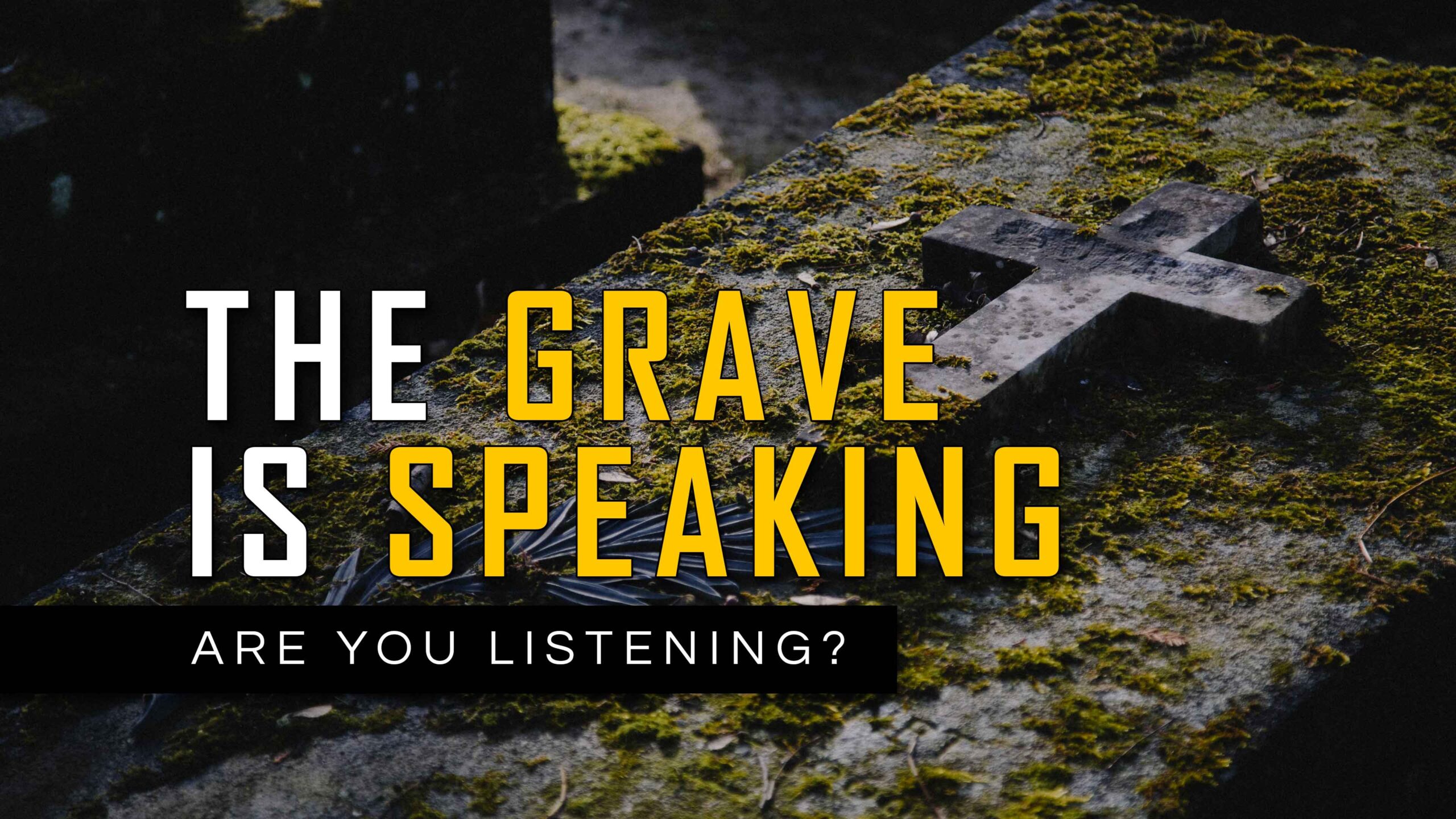This is a message that I delivered for my grandmother’s funeral from the story of Lazarus in John 11:17–44. Funerals are a sober time and opportunity for us to reflect on death, life and how to live in light of the grave. I pray that it would be helpful for many.
Here is the video of the message. (Sorry, parts of the video cut out due to technical difficulties)
Below is the full sermon manuscript.
There have been and there will be many tears today. And tears are fitting at a funeral where we say farewell to a beloved grandmother, mother, aunt, sister, and friend to us all.
Cecila Maharaj, my Mama, was a loving grandmother to me and my siblings and cousins. She helped to raise us and I thank God for the time we had with her, but even more than that, I thank God that this life will not be the only time we will have with her.
Ma was an ardent Hindu while we were growing up. I remember many of the poojas, lighting dias, the smell of incense, the taste of sneaking warm parsad from the pot, and the pictures of various Hindu gods around the house. We were Christian, and much of the rest of our family were Hindus. We prayed earnestly that God would open their hearts to the truth of Christianity—a prayer which God in His amazing grace continues to answer. Over the years, many of my aunts and uncles renounced Hinduism and bowed their knees to Jesus Christ as their LORD and Saviour. But Ma and Nana said they were born Hindus, and they would die Hindus.
However, though they were born Hindus, through Jesus Christ they were born again to a new and living hope. It is my great joy to know that the faith of my grandparents rested in Christ alone and that now that faith has become sight.
I believe that Ma would want you all here to know that same faith.
So today, I want to talk to you from the story of Lazarus in John 11 about the grave, tears, and the final word.
The Grave has something to say to us…
That great preacher of wisdom reminds us in Ecclesiastes 7 that,
It is better to go to the house of mourning than to go to the house of feasting, for this is the end of all mankind, and the living will lay it to heart…The heart of the wise is in the house of mourning, but the heart of fools is in the house of mirth.
The older you get, the more you realize that although life must be lived forward, it is understood backward. Here, the wise preacher of Ecclesiastes urges us to consider the end of the matter, to contemplate the house of mourning and what it has to teach us, and then live in light of that. He’s calling us to live life backward in light of its end.
So, young and old here today, don’t be a fool.
Pay attention and gain some wisdom from what this house of mourning has to teach us. Our culture today keeps us distracted from thinking deeply with a constant flow of trivialities delivered via the glowing rectangles in our pockets live-streamed from the house of mirth. But the grave has something to say to us today.
So, take advantage of the moments like this that God gives to us to gain wisdom for life. Because we are all on our way to the grave—calamities strike, our bodies deteriorate, and what once was perky finds out that gravity always wins.
The grave awaits, it is coming and it has something to say to us.
It reminds us of our mortality and the brevity of this life. The grave asks us to consider our lives because we have a set appointment with it one day. But the grave also speaks to us of the life to come.
An Embodied Hope
Just before our passage, Jesus had intentionally delayed going to Bethany. He knew that his friend Lazarus was fatally ill and going to die. But in those few days of his delay, how anxious was Lazarus’s family?
Surely they would have seen Lazarus’s declining condition, their hearts aching as they saw their beloved brother succumb to his ailment. What heartache and helplessness they must have felt, looking at a beloved one fade and not being able to do anything to help it.
Does this sound familiar?
In John 11:17–27 we read,
Now when Jesus came, he found that Lazarus had already been in the tomb four days. Bethany was near Jerusalem, about two miles off,and many of the Jews had come to Martha and Mary to console them concerning their brother. So when Martha heard that Jesus was coming, she went and met him, but Mary remained seated in the house. Martha said to Jesus, “Lord, if you had been here, my brother would not have died. But even now I know that whatever you ask from God, God will give you.” Jesus said to her, “Your brother will rise again.” Martha said to him, “I know that he will rise again in the resurrection on the last day.” Jesus said to her, “I am the resurrection and the life. Whoever believes in me, though he die, yet shall he live, and everyone who lives and believes in me shall never die. Do you believe this?” She said to him, “Yes, Lord; I believe that you are the Christ, the Son of God, who is coming into the world.”
Martha knew that there was a Day of Resurrection coming and that that was the hope of God’s people. They would be raised to eternal life in a renewed and perfected earth. It is a very embodied hope, not like the ethereal portrayals of heaven we see in comic strips of sitting on a cloud playing the harp for a sleepy eternity.
God made us as both body and spirit, and He said in Genesis 1 that this was good.
We are made for an embodied existence, and this is part of why death is so troubling for us. It separates body and spirit and it’s not the way we were created to be for eternity.
The sight of a beautiful sunset, the taste of your favourite meal, the aroma of freshly baked banana bread, the delight of your favourite song on the radio, or the warm embrace of a loved one—these are all blessings of this embodied material existence. They’re all good gifts from God—who created a good material universe for us to enjoy. However, the once-perfect creation was corrupted by our sin.
And Sin Fills the Grave…
Humanity’s parents, Adam and Eve, rebelled against God and brought death into the world. We all inherit their rebellious natures. The Bible says that all have sinned and that we are all born as children of wrath, spiritually dead in our rebellion and set against God’s perfect ways.
And if you don’t believe this, just consider—have you ever had to teach a child how to do wrong? To lie, steal, be rebellious or lash out when they don’t get their way? My wife and I have a 1.5-year-old, and it’s remarkable how young this sinful rebellion comes out.
I’m convinced that God made babies small so that they won’t kill you when they don’t get their way, and He made them cute so you wouldn’t kill them!
We all come into the world as spiritual stillborns—dead to the perfect ways of God.
Even for those of you who say you’re not religious, even you have some moral code. A list of dos and don’ts that you made up that you think defines a good person.
Let me ask you, have you perfectly lived up to that moral code? No.
Is it because you didn’t know about it? Well, no – you made it up!
So, why is it that even when we set the bar for ourselves we fail?
It is because of our sinful nature we have all inherited from Adam.
We’re not sinners because we sin. We sin because we’re sinners.
This is why we’re here today—sin fills the grave—for the Bible says that the wages of sin is death.
Martha knew this all too well. The grave had come for Lazarus. But she knew that the grave did not have the final word—that he would rise again on the Last Day. However, what she did not realize was that the One who gave that Final Word was standing right in front of her.
Jesus tells her,
“I am the resurrection and the life. Whoever believes in me, though he die, yet shall he live,and everyone who lives and believes in me shall never die. Do you believe this?”
Shall never die? Yes.
We are born spiritually dead in our sins, but through faith in the finished work of Christ’s death and resurrection, we are born again, resurrected to spiritual life—and that spiritual life does not end though this mortal flesh may perish.
For the Christian, to be absent from the body is to be present with the LORD. That is where Ma is right now. Then when Christ returns, the physical bodies of those who died in Christ will be raised and transformed into an imperishable body that will live eternally.
Jesus Christ was God in human flesh who lived a sinless life, gave His life to pay the debt of sin that we owed, and then conquered the grave in His resurrection so that through him, we get spiritual life now, and resurrection life to come.
It is because Jesus’s grave is empty that one day all graves will be emptied.
But The Grave Still Brings Tears
The story goes on to say,
When she [Martha] had said this, she went and called her sister Mary, saying in private, “The Teacher is here and is calling for you.” And when she heard it, she rose quickly and went to him. Now Jesus had not yet come into the village, but was still in the place where Martha had met him. When the Jews who were with her in the house, consoling her, saw Mary rise quickly and go out, they followed her, supposing that she was going to the tomb to weep there. Now when Mary came to where Jesus was and saw him, she fell at his feet, saying to him, “Lord, if you had been here, my brother would not have died.” When Jesus saw her weeping, and the Jews who had come with her also weeping, he was deeply moved in his spirit and greatly troubled. And he said, “Where have you laid him?” They said to him, “Lord, come and see.” Jesus wept. So the Jews said, “See how he loved him!” But some of them said, “Could not he who opened the eyes of the blind man also have kept this man from dying?”
Isn’t it interesting that Martha’s sister also greets Jesus with the same words? “Lord, if only you had been here—Lazarus would not have died!”
Can’t you hear her anguish? Perhaps in the previous days, as the sisters helped wrap the lifeless body of their brother, they had cried these same words to each other in their lament. They had seen Jesus perform many miracles, and heal many sicknesses. Surely he would have healed his dear friend Lazarus too! If only… if only he had come sooner!.. they would have had more time with their brother and goodbye would not have come so quickly.
But the grave had come for Lazarus. It had spoken and it brought tears.
The time for embraces had passed, the time for spending time together, the time for reconciling broken relationships, the time for teaching his kids, the time for saying those things he’d been meaning to say—had all been swallowed up by the grave.
The grave is coming for all of us, and it’s speaking to us today. Are you listening, friends?
The grave brought tears for Lazarus’s loved ones.
The Grave Brought Tears to Christ
In this section, we find a verse that has astonished many. It’s the shortest verse of the Bible—“Jesus wept”.
The sinless Messiah, the all-powerful God of creation in human flesh, stood before this grave and shed tears for his friend whom He knows He will resurrect in only moments.
Why?
Some think that it was for sorrow at the loss of Lazarus. But this would not make sense given what Jesus was about to do nor is it the reason the text gives to us.
Verse 33 says that it was in response to seeing Mary and the crowd there weeping that Jesus was “deeply moved in his spirit and greatly troubled”. The words there used in the original language mean that Jesus had a strong feeling of indignation and was greatly stirred up.
These were not tears of sorrow.
This was God incarnate burning with indignation at what sin had done to His good creation—the pain and sadness, the brokenness and corruption, the separation and anguish it had brought to the people He loved. Here Jesus Christ confronts the enemy he had come into the world to destroy. And his heart is filled with holy indignation at the destruction death had caused.
The grave had come, it had spoken. But now, it was Christ’s turn to speak.
Christ’s Final Word
Then Jesus, deeply moved again, came to the tomb. It was a cave, and a stone lay against it. Jesus said, “Take away the stone.” Martha, the sister of the dead man, said to him, “Lord, by this time there will be an odor, for he has been dead four days.” Jesus said to her, “Did I not tell you that if you believed you would see the glory of God?” So they took away the stone. And Jesus lifted up his eyes and said, “Father, I thank you that you have heard me. I knew that you always hear me, but I said this on account of the people standing around, that they may believe that you sent me.” When he had said these things, he cried out with a loud voice, “Lazarus, come out.” The man who had died came out, his hands and feet bound with linen strips, and his face wrapped with a cloth. Jesus said to them, “Unbind him, and let him go.”
Four days in the grave, Lazarus was—as we would say in Trini—dead dead! Rigor Mortis had set in, blood which once flowed through his veins would have pooled, and decomposition had begun the process that would return all of Adam’s children to the dust.
Whether by decomposition in the grave or cremation, look around at the faces around you, in a short time we will all return to the dust.
And what will become of the life we lived? What legacy will be left behind? How will we be remembered?
What will be the final word when the grave speaks for us?
It’s interesting what Jesus’s first words are in this scene.
He reminds Martha that if she believed, she would see the glory of God. Lazarus’s death was an opportunity for the glory of God to be displayed through his resurrection—and so too is every Christian’s life and death.
But Christians, you don’t have to wait for your death to glorify God—today as you live out that resurrection life you glorify God.
Paul says that,
“I have been crucified with Christ. It is no longer I who live, but Christ who lives in me. And the life I now live in the flesh I live by faith in the Son of God, who loved me and gave himself for me.’ (Gal. 2:20)
Christians are already dead men living for Christ.
Jesus commanded Lazarus to come out and the dead man obeyed him! (Amazing that some living people don’t obey Christ’s word) Lazarus walks out, still wrapped in his burial cloths—not as a rotting zombie, but fully restored to life.
The grave no longer had the final word—for at Christ’s word, the grave had to submit to His command.
In fact, some have speculated that had Christ not specified, “LAZARUS” to come out, all the bodies of the deceased saints would have at that moment come out at the beckon of their LORD.
But that Day is coming when all will hear His voice beckon them to come out. We are assured of this in Acts 17:30–31,
“The times of ignorance God overlooked, but now he commands all people everywhere to repent, because he has fixed a day on which he will judge the world in righteousness by a man whom he has appointed; and of this he has given assurance to all by raising him from the dead.”
The resurrection of Christ as a fact in history is the guarantee that there is coming a Day of Judgment. Unlike beliefs in a cycle of reincarnations where you have no memory of your past life nor the reason for the karma you’re supposed to be paying off, the Bible says that it is appointed unto man once to live and then comes judgment.
The End of the Matter…
The preacher Matthew Henry once wrote,
“Tears are a tribute to our deceased friends. When the body is sown, it must be watered. But we must not sorrow as those that have no hope; for we have a good hope through grace both concerning them and concerning ourselves.”
We will shed many tears today and in days to come for Ma and possibly over the graves of other loved ones in the future.
However, the same One who came and conquered the grave has given the final word over it. At His command, all the graves shall be emptied—you will hear His voice on that Day either as your Gracious Saviour or your Awesome Judge. And He will justly reward every thought, word and deed we have done in this life.
For those who are in Him, He will wipe away every tear. Then, death will be no more, neither shall there be more pain or sadness. But for those who reject Him, there awaits not a second chance at life, but the fearful judgment of falling into the hands of the Living God.
The grave is coming, friends. It has spoken to us today. But Christ is also coming and He has the final word. Do you have ears to hear?
He calls all people everywhere to repent. Turn away from trusting in anything or anyone else other than Him, put your trust exclusively in Christ alone. He is not another god you can add to a pantheon of gods, for the LORD of glory does not share His throne. Our faith must rest solely in Jesus Christ and His finished work on the Cross on our behalf, not in any good works that we can do to earn a reward or pay off our karmic debt.
Instead, the way to salvation is simple. Confess your sins and throw yourself wholly upon Christ and you will find Him to be a gracious and merciful King who will forgive all your sins, welcome you into His family, give you a place to serve in His Kingdom today and raise you up to reign with Him on that Last Day.
The grave is coming. It has spoken.
Are you listening?




